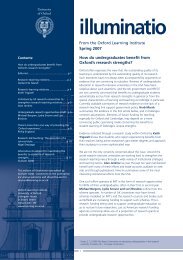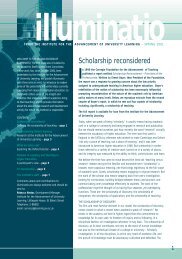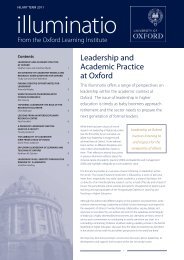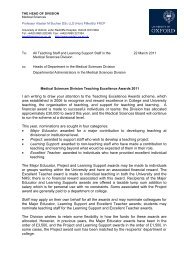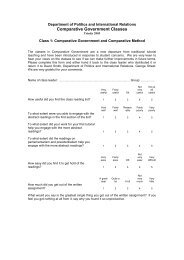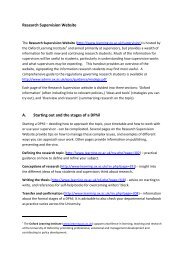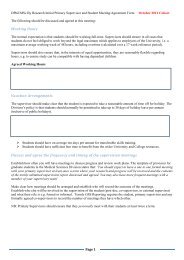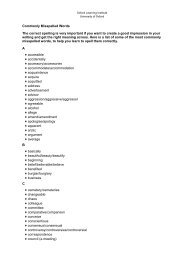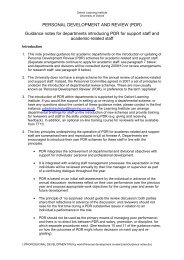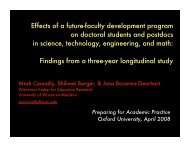Developing the whole student - Oxford Learning Institute - University ...
Developing the whole student - Oxford Learning Institute - University ...
Developing the whole student - Oxford Learning Institute - University ...
You also want an ePaper? Increase the reach of your titles
YUMPU automatically turns print PDFs into web optimized ePapers that Google loves.
Stimulus paper by Kathleen M. Quinlan 06<br />
that focus on <strong>whole</strong> <strong>student</strong> development are attractive to <strong>student</strong>s and <strong>the</strong>ir families. Indeed,<br />
research on school choice in both Europe and <strong>the</strong> USA also shows that parents choose faithbased<br />
schools because <strong>the</strong>y provide a strong foundation for <strong>whole</strong> <strong>student</strong> development<br />
through clear, distinct commitments to a set of well-articulated guiding values, ra<strong>the</strong>r than<br />
for <strong>the</strong> religious content per se 23 . Thus both faith-based and secular universities could use this<br />
opportunity to articulate <strong>the</strong>ir commitments to <strong>student</strong>s on <strong>the</strong>ir own terms.<br />
Using this historic moment in UK higher education to refocus attention on holistic <strong>student</strong><br />
development may also boost academic morale. Creating an institutional environment aligned<br />
to <strong>student</strong>s’ holistic development (however defined) would enable academics to reconnect<br />
with <strong>the</strong> core values and interests that brought <strong>the</strong>m to teaching and reinvigorate commitment<br />
to a common cause. Palmer 24 has been a leader in calling for ‘renewal’ of <strong>the</strong> academy through<br />
attention to integrative education that helps <strong>student</strong>s ‘become more fully developed human<br />
beings’ 25 . He focuses on changing <strong>the</strong> academy through collegial conversation; it is central to<br />
how <strong>the</strong> academy works and can be an essentially humanising process. In <strong>the</strong> UK, Maxwell has<br />
been a long-standing proponent of an orientation to academic work which ‘... puts <strong>the</strong> mind in<br />
touch with <strong>the</strong> heart, and <strong>the</strong> heart in touch with <strong>the</strong> mind, so that we may acquire heartfelt<br />
minds, and mindful hearts’ 26 .<br />
23<br />
Glenn (2005)<br />
24<br />
Palmer (2000), Palmer,<br />
Zajonc et al (2010)<br />
25<br />
Palmer (2010) p2<br />
26<br />
Maxwell (1976)<br />
27<br />
Robinson, Lloyd et al (2008)<br />
Questions to be addressed<br />
If universities take <strong>the</strong> lead in re-articulating <strong>the</strong>ir core commitments and <strong>the</strong>ir relationship with<br />
<strong>student</strong>s and society, <strong>the</strong>y can communicate <strong>the</strong>ir value in broader terms and, potentially, assert<br />
<strong>the</strong>ir moral authority as a sector. This paper lays <strong>the</strong> foundation for a new discourse of <strong>student</strong><br />
development and offers a framework for understanding how to create rich <strong>student</strong> experiences<br />
by briefly addressing five key questions:<br />
1. What is meant by ‘developing <strong>the</strong> <strong>whole</strong> <strong>student</strong>’ and why would higher education<br />
embrace this educational purpose?<br />
2. To what extent does a university experience influence <strong>student</strong>s’ holistic development?<br />
3. What educational activities support this type of development?<br />
4. What leadership is required?<br />
5. What are <strong>the</strong> likely leadership challenges, pitfalls and lessons for those wishing to<br />
implement programmes with <strong>the</strong>se goals in <strong>the</strong> UK higher education context?<br />
This approach, and <strong>the</strong> substantial focus in Questions 1 to 3 on educational processes, is<br />
based on <strong>the</strong> assumption that we need to contextualise leadership, by focusing specifically on<br />
leadership of something for something. In this case, <strong>the</strong> argument is for leadership of teaching for<br />
<strong>the</strong> purpose of promoting <strong>student</strong>s’ holistic development. Drawing on <strong>the</strong> notion of instructional<br />
leadership in school settings 27 , this paper assumes that leaders need an understanding of<br />
learning processes and must be involved actively in leading educational enhancement efforts.<br />
In <strong>the</strong> following sections, we consider each of <strong>the</strong>se questions in turn to build a solid foundation<br />
upon which leaders can work alongside <strong>the</strong>ir colleagues in creating learning environments that<br />
take a broader view of <strong>the</strong> <strong>student</strong> learning experience.<br />
The paper syn<strong>the</strong>sises and interprets existing, but often unconnected, literatures, including <strong>the</strong><br />
large body of literature on <strong>student</strong> development in higher education in <strong>the</strong> USA (because <strong>the</strong>re<br />
is very little research focused on <strong>student</strong> development in <strong>the</strong> UK and o<strong>the</strong>r English-speaking<br />
countries) and some research on leadership in primary and secondary schools (because research<br />
on schools leadership is much more extensive than on higher education leadership).



